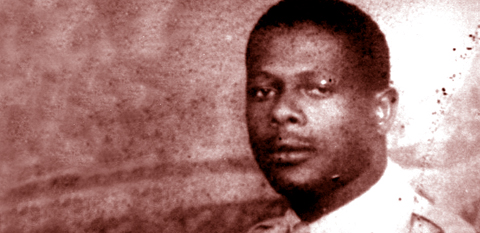Eric Roach. Photograph courtesy Laurence Breiner
Today’s Stabroek News includes an essay by Al Creighton on the Tobagonian poet Eric Roach, one of Caribbean literature’s great tragic figures.
Born in Tobago in 1915, educated at a grammar school in Scarborough, Roach began publishing his poems in the late 1930s in local newspapers. Over the next forty years he created an important body of work, both poems and plays, and in the 1950s developed a regional audience via literary journals like Bim and Kyk-Over-Al and the BBC Caribbean Voices programme. But, as the scholar Laurence Breiner writes,
Some fear of going unnoticed haunted Roach throughout his career. He often seemed to be caught in the wrong time or the wrong place. In the 1950s, his most productive decade, he watched talented contemporaries turn away from writing poetry, or emigrate, or both: chief among them George Lamming, Wilson Harris, Cecil Herbert, and H.A. Telemaque. Committed to the Caribbean, and sure (in those days) of his talent, he worried whether poetry could survive in the Caribbean climate (social as much as meteorological).
In 1962 Roach stopped writing poems for eight years, and though his work was now included in a number of international anthologies, he appears to have struggled with a sense of futility and despair. In 1965, Roach wrote this biographical note for the British anthology Verse and Voice:
He has been a soldier, teacher, civil servant and failed writer. Born nearly fifty years ago in the tiny, little known island of Tobago where his family are peasants, Roach hoped to become a poet, but his talent for verse did not develop beyond his native dooryard, and after a few years he abandoned the writing of verse.
In 1974, in an act better remembered than any of his poems (the final irony), Roach drowned himself at Quinam Bay.
Two decades later, Roach’s collected poems were finally published, and in 2008 Breiner’s book Black Yeats: Eric Roach and the Politics of Caribbean Poetry offered a sustained critical assessment of his oeuvre. The November 2006 CRB included an essay by Breiner, “Laureate of nowhere”, drawing on his research for Black Yeats, and considering the reasons for Roach’s “low visibility” among Caribbean writers:
Roach at heart always remained a man of the dooryard and the village, but as a poet he had global instincts, a hunger to be widely heard and heeded. He saw the Federation as presenting him with a resolution for the dilemma of his generation, in the form of an opportunity to vastly expand the “horizon” of his audience while staying at home on the “private hillock” of his island, rather than emigrating. If the Federation had succeeded, he would have been its national poet, with a bronze statue on the grounds of the now-vanished capital. But it failed, and Roach was suddenly the laureate of nowhere.
In our August 2008 issue, Vahni Capildeo gave a contemporary Caribbean poet’s assessment of Roach’s career, in her review of Black Yeats. Roach’s poems and his life story — the example of his dedication and his despair — continue to haunt some younger Trinidadian writers. Jennifer Rahim’s recent book Approaching Sabbaths — reviewed by Ian Dieffenthaller in the May 2010 CRB — includes a sequence of poems titled “A Return to Quinam Bay”. Rahim re-traces Roach’s final journey and meditates on the intersection of literature and history, truth and ambition:
Quinam is a bay west of the first lies
of discovery. Three hills that never were,
people never seen. There a poet swamto sea to reverse history. My version:
invention was his one hope all along,
but its light dulled to night in him.I write now to make all our stories go on.





